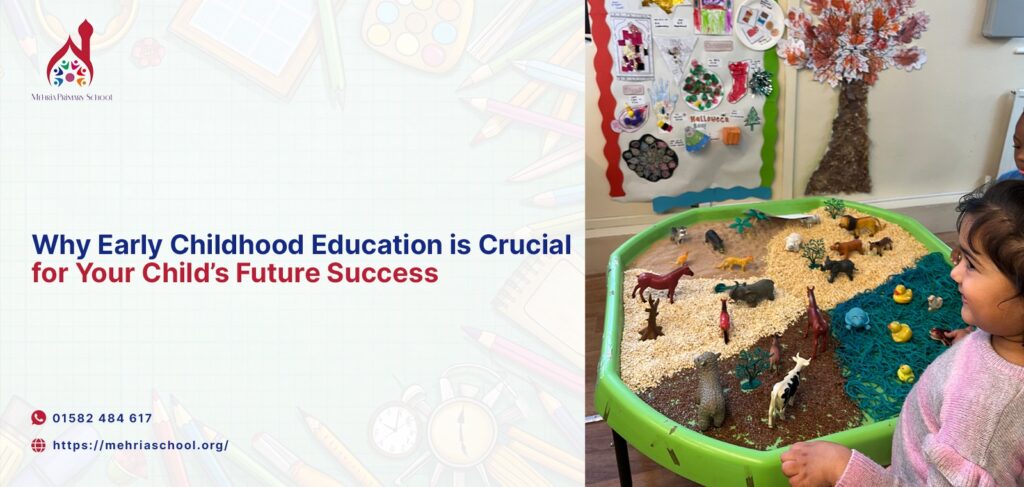Early childhood education forms the foundation of all future successes, as it is the initial laying down of most of the child’s academic, social, and emotional development. The evidence appears to support the wide- and long-range values of early education: its impacts can be found in academic performance, social skills, emotional resilience, and physical development. This blog from Mehria Primary School Luton will delve into how early childhood education in the UK will shape your child’s future and why it is a very important investment for both the parent and child.
Early childhood education importance
The importance of early childhood education can’t be explained in words. These are the formative years, from birth to eight, which define a child’s mental abilities, social skills, and holistic development. During this period, a child’s brain is particularly malleable and, therefore, quite an opportune time to lay the foundation for future learning and development.
Fostering Cognitive Development
One of the benefits of early childhood education is the development of cognition. The properly structured early education programs expose children to ways of becoming creative and critical thinkers who are also equipped with problem-solving skills. Whether it is making puzzles, contributing to a story’s telling, or conducting experiments, this all acts to simulate curiosity and build excitement towards learning throughout their life.
Social and Emotional Development
Early childhood education is the key stage in life where development occurs on social and emotional levels. In a guided setting, children learn to work with others, share and show understanding from and to fellow peers and teachers. This is an important ingredient for their later success at school—emotional regulation and self-confidence.
Physical Development
Physical development is another aspect in which early childhood education is beneficial. Programs designed with physical activities help children to develop both gross and fine motor skills, improve coordination, and maintain physical health. Whether through:
- Organised sports
- Free play
- Creative activities like drawing and building
Early childhood education aids in promoting overall growth. It is vital for a child’s overall development.
Long-Term Benefits of Early Childhood Education
Studies back the long-term benefits of early childhood education. Children who observe quality early education programs generally:
- Perform better in school
- more likely to graduate from high school
- go on to higher education.
- exhibit more social competence
- less likely to become delinquent
- more likely to get better jobs
- make more money
- be healthier in adulthood.
Benefits of early childhood education for parents
The gains made in early childhood education are not enjoyed by the child alone. Parents who have their children enrolled in high-quality early learning programs often feel less stressed and are more productive. Such parents can now work and do something else with peace of mind without having their child out of a safe and compassionate environment. Many early childhood education programs offer resources and support for parents to understand how their child is growing and how they can contribute to the growth of children at home.
Early childhood education is noted as a very important area in the UK’s education system. The UK approach values the underpinning nature of the play-based pedagogy, which ignites children’s natural curiosity and enthusiasm for learning. Schools like Mehria Primary School in Luton provide comprehensive early childhood education programs that are aligned with national standards and focus on developing children holistically.
The role of planning in early childhood education cannot be underestimated. Good planning will act as a cornerstone to the success of early childhood education. It is the one that goes the extra mile to accomplish the developmental needs of an individual child by providing an educational experience that is structured and flexible and covers all areas of development: cognitive, social, emotional, and physical. It also provides for goals with measurements, a check on any progress, and alterations to fit the occasion to maximise the learning process.
FAQs
What is early childhood development, and what are its benefits?
Early childhood development refers to the growth of a child’s body, brain, personality, and emotions from birth to about eight years old. Early childhood education improves:
- Brain Development
- Social skills
- Academic performance later in life.
What is the importance of early childhood?
Early childhood is vital as it defines a person’s ability to learn and grow later. During this time, the brain is in its developmental stages. And experiences shape a child’s:
- Future health
- Behaviour
- Learning capabilities
What are the benefits of planning in early childhood education?
Planning in early childhood education assures that learning activities are suitable. And matched to each child’s needs. It helps educators:
- set clear goals,
- monitor progress,
- and create a supportive environment that fosters a child’s overall development.
How does education benefit children?
Education gives children the knowledge and skills necessary for personal and academic success. It supports:
- Cognitive development
- Social development
- Emotional development
- Physical development
All that lay the basis for a productive life.
What are the long-term benefits of early childhood education?
Long-term benefits of early childhood education include:
- better academic results,
- improved social skills,
- higher earnings
- reduced likelihood of engaging in delinquent behaviour.
- overall better health
- well-being throughout life.
What is early childhood education in the UK?
Early childhood education in the UK focuses on play-based learning and overall development. The curriculum is designed to nurture a child’s curiosity and love for learning while meeting national educational standards.
Why study early childhood studies?
Studying early childhood provides individuals with the knowledge and skills to support child development. It prepares them for:
- careers in education,
- childcare, and related fields,
- significantly impact children’s lives
What is learning in early childhood?
Early childhood learning involves acquiring basic skills in areas like:
- Language
- Math
- Social interaction
- Problem-solving
It is a critical period for developing the cognitive, social, and emotional skills that children will use throughout their lives.

